Module 12 Western music Unit 1 上课课件(共56张PPT)
文档属性
| 名称 | Module 12 Western music Unit 1 上课课件(共56张PPT) | 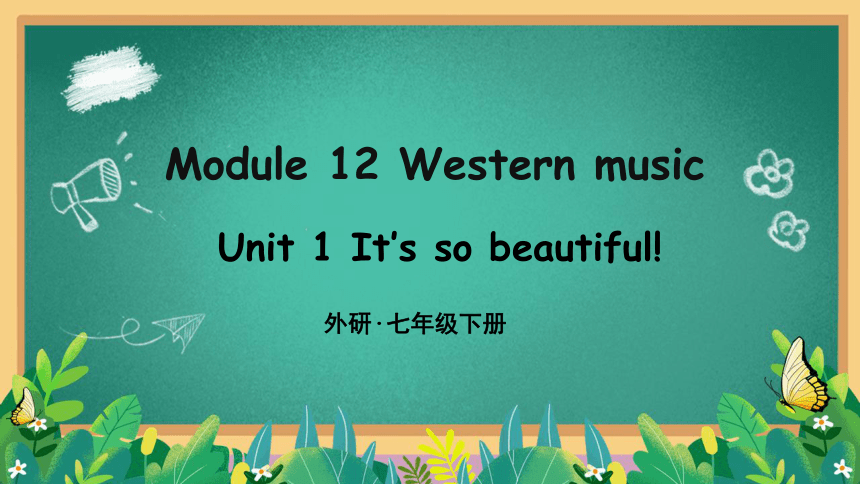 | |
| 格式 | pptx | ||
| 文件大小 | 136.5MB | ||
| 资源类型 | 教案 | ||
| 版本资源 | 外研版 | ||
| 科目 | 英语 | ||
| 更新时间 | 2024-01-15 13:56:34 | ||
图片预览

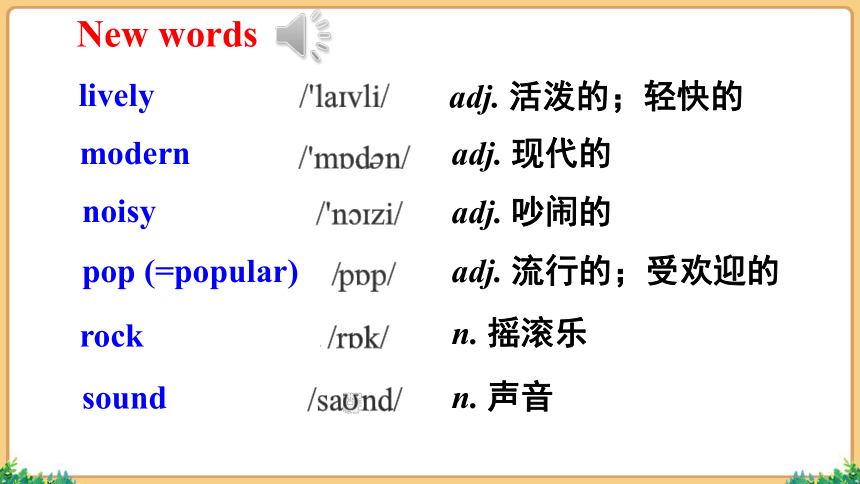
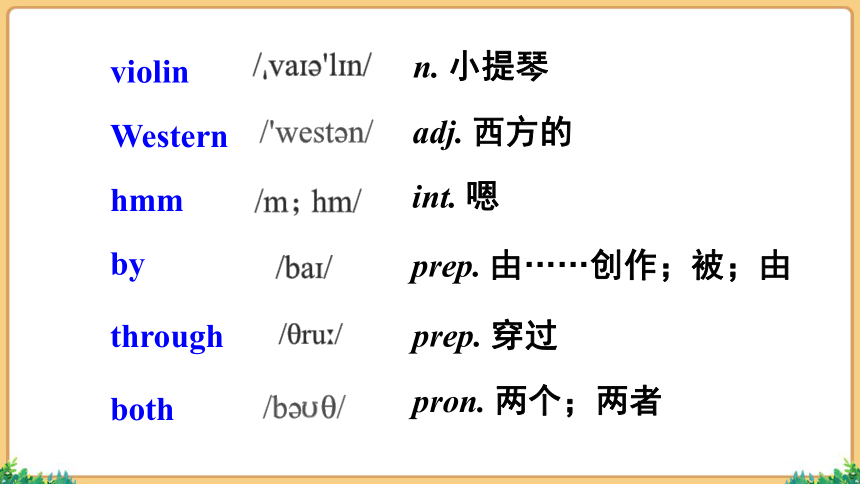
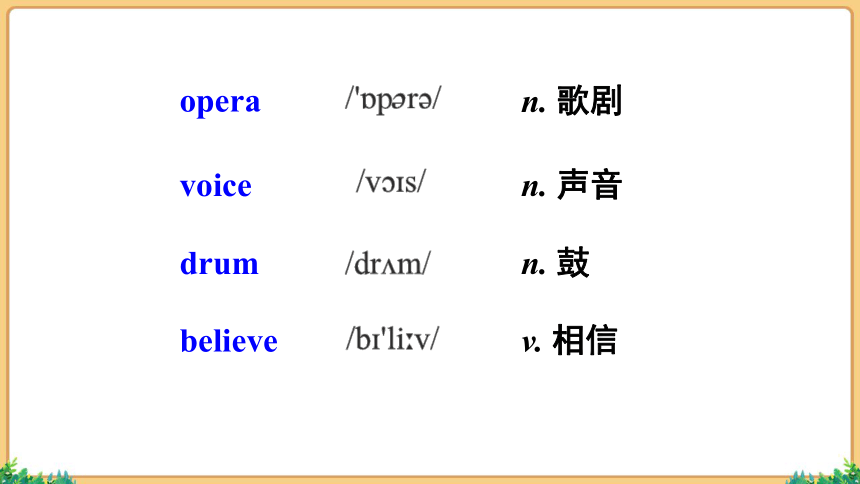
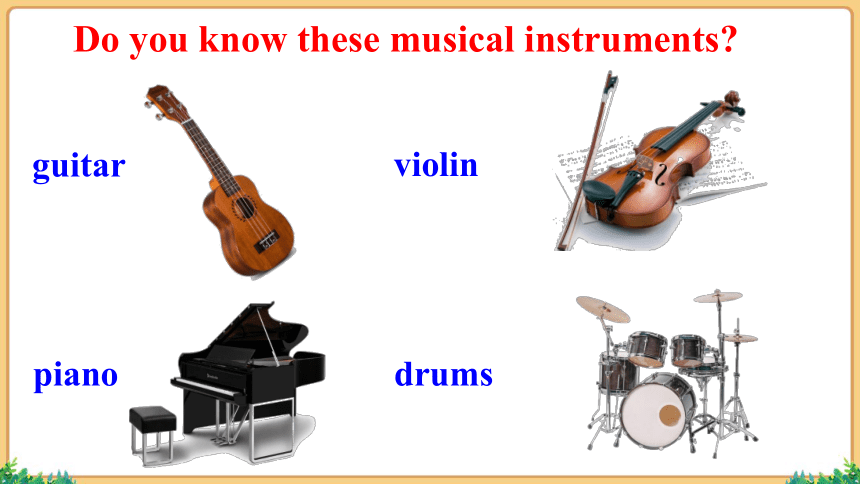
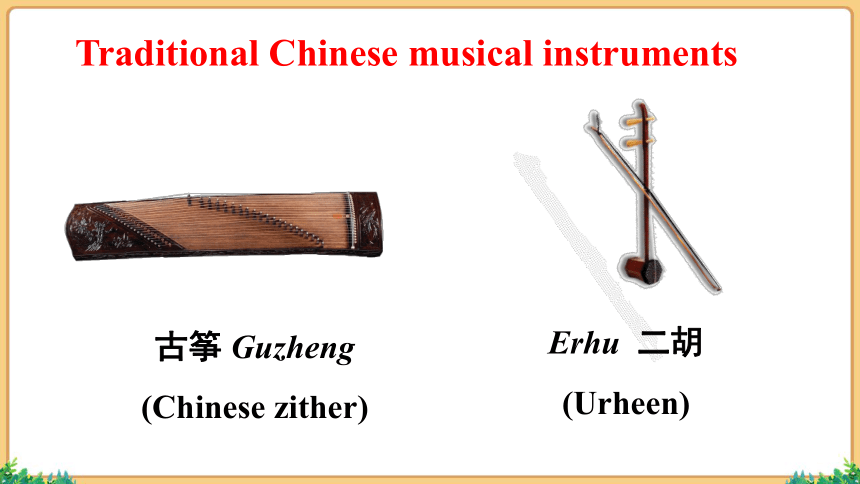
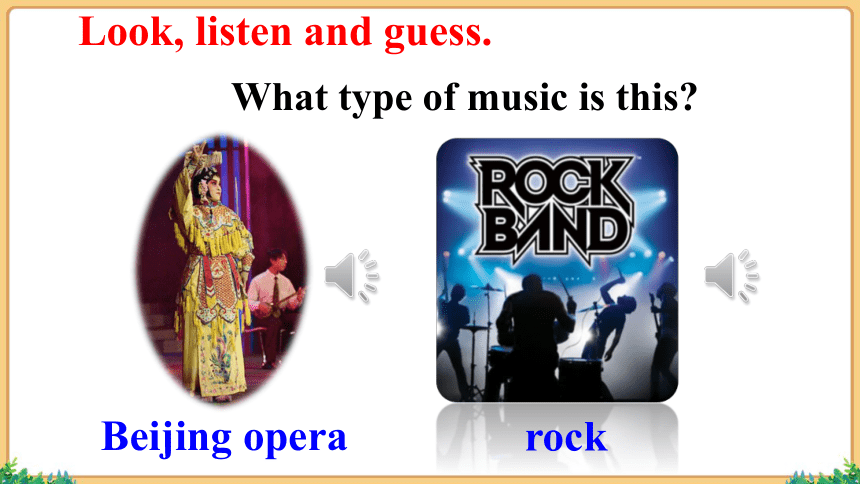
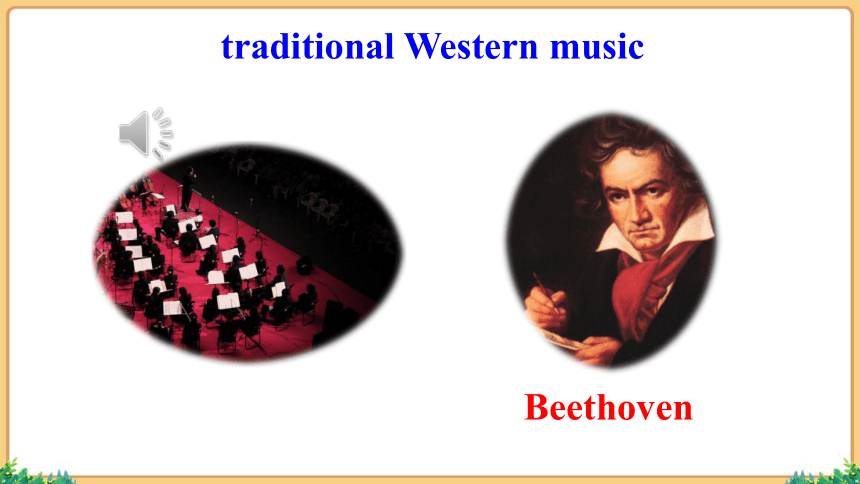



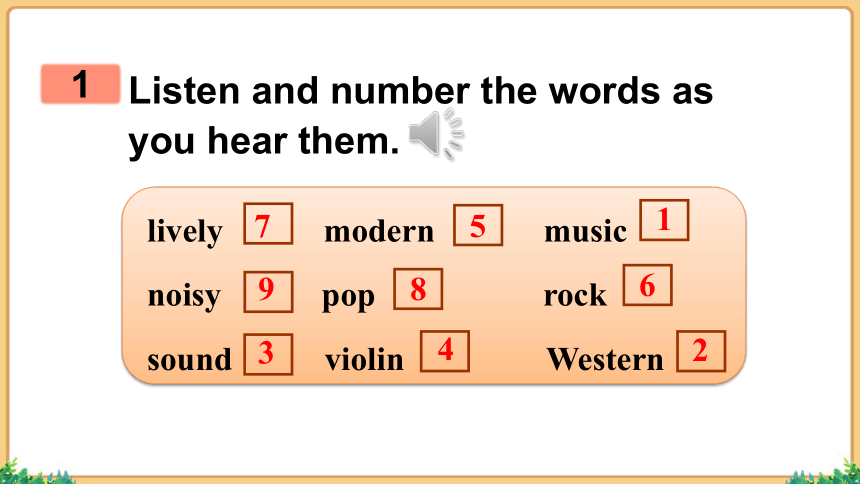
文档简介
(共56张PPT)
Module 12 Western music
外研·七年级下册
Unit 1 It’s so beautiful!
New words
adj. 活泼的;轻快的
lively
adj. 现代的
modern
adj. 吵闹的
pop (=popular)
adj. 流行的;受欢迎的
n. 摇滚乐
noisy
rock
sound
n. 声音
Western
adj. 西方的
violin
n. 小提琴
prep. 穿过
through
pron. 两个;两者
both
by
prep. 由……创作;被;由
hmm
int. 嗯
believe
n. 歌剧
voice
n. 声音
opera
v. 相信
drum
n. 鼓
guitar
violin
piano
drums
Do you know these musical instruments
Erhu 二胡
(Urheen)
古筝 Guzheng
(Chinese zither)
Traditional Chinese musical instruments
Look, listen and guess.
What type of music is this
Beijing opera
rock
traditional Western music
Beethoven
pop music
blues
Music
country
hip-hop music
folk music
rock
classical
techno music
Listening and vocabulary
1
Listen and number the words as you hear them.
lively modern music
noisy pop rock
sound violin Western
1
2
3
4
5
6
8
9
7
2
Work in pairs. Answer the questions about the conversation in Activity 1.
1. Which modern music does Tony like
2. What does Tony’s mum think about rock
music
3. Why doesn’t Tony like traditional Western
music
4. Which music does Tony’s dad think is too
noisy
Now listen again and check.
1. Which modern music does Tony like
He likes pop and rock music.
2. What does Tony’s mum think about rock music
It’s very lively.
3. Why doesn’t Tony like traditional Western music
It’s too slow.
4. Which music does Tony’s dad think is too noisy
He thinks pop music is too noisy.
Tony: What kind of music do you like, Dad
Tony’s dad: I like traditional Western music,
especially the sound of violins. What
about you, Tony What kind of music
do you like
Tony: I like modern music. I love rock. It’s
great. You like rock, don’t you, Mum
Tapescript
Tony’s mum: Yes, it’s very lively. But you
don’t like traditional Western
music, do you, Tony
Tony: No. It’s too slow. I can’t dance to
it. I like pop music.
Tony’s dad: I’m not a big fan of pop music.
It’s too noisy.
Let’s watch a video first.
3
Listen and read.
(The Blue Danube)
Daming: Hmm, this is Western music, isn’t it Can
you hear the violin and the piano It’s so
beautiful! Is this by Strauss or Mozart
Lingling: I’m not sure...
Betty: It’s by Strauss. I love his music! Do you
know anything about him, Tony
Tony: Was he German
介词,由……创作
adj. 西方的
Betty: No, he was born in Vienna, the capital of
Austria. What a beautiful city! This is
called The Blue Danube. The Danube is a
river in Europe. It goes through Vienna.
Lingling: Do you like traditional Western music
or pop music, Betty
Betty: Well, I like both. You listen to pop music,
Lingling, don’t you
Lingling: Yes, I do. I also like Beijing opera. Listen
to this fantastic voice.
Tony: Hmm, the sound is very... different, isn’t
it I’m a fan of rock music. Listen to this!
Daming: Hey! Give us a break!
Lingling: Rock music Listen to those drums!
Daming: It’s so noisy! And much too fast!
Tony: You don’t like rock music I don’t believe it!
give sb. a break!
让某人清净一会儿吧!
What a beautiful city!
I’m a fan of rock music.
Give us a break!
I don’t believe it!
Everyday English
Read and choose the best answer for each sentence.
( ) 1. Strauss was not _______, he was _____.
A. Austrian, German
B. German, Austrian
C. Vienna, Finland
( ) 2. Vienna is the capital of _____.
A. German B. Austria C. Norway
( ) 3. The Danube is the river in ______.
A. London B. Vienna C. Paris
B
B
B
( ) 4. Lingling listens to _____ music.
A. jazz B. classical C. pop
( ) 5. The Blue Danube is _______ music.
A. pop B. techno C. Western
( ) 6. Lingling also likes _____.
A. classical music
B. Beijing Opera
C. rap music
C
C
B
Now check (√) the true sentences.
1 They’re listening to Western music.
2 Tony knows little about Strauss.
3 Strauss was born in the capital of
Australia.
4 The Blue Danube is pop music.
5 Lingling enjoys Beijing opera very much.
√
√
√
×
×
4
Check (√) the types of music the students like.
Tony Lingling Betty Daming
traditional Western music
Beijing Opera
pop
rock
Name
√
√
√
√
√
√
Music
5
Complete the sentences with the correct form of the words from the box.
believe, both, drum, German, noisy, voice
1. Strauss wasn’t _________. He came from
Austria.
German
2. Daming thinks the _______ in rock music are
too ________.
3. Tony can’t _________ that Daming doesn’t
like rock music.
4. Betty likes ______ traditional Western music
and pop music.
5. Tony thinks the sound of the ________ in
Beijing opera is very different.
drums
noisy
believe
both
voice
6
Complete the sentences about yourself.
My favourite music is...
I like it because...
My parents like...
Pronunciation and speaking
7
Listen and read.
What a beautiful city!
It’s so beautiful!
I love his music!
Listen to this!
8
Work in pairs. Ask and answer questions about the music you like or don’t like.
— What music do you like
— I like pop. It’s lively and good to dance to,
but I don’t like rock. It’s too noisy. What
about you
What music do you like
I like Blues. It’s relaxing. What about you
I like _______.
Role-play
1. lively 形容词,意为“活泼的;轻快的”, 可
以指人或物,在句中可作定语或表语。
Language points
例:这些活泼的孩子使得课堂生动活泼。
The lively children make the class lively.
巴黎是一座充满活力的城市。
Paris is a lively city.
2. noisy 形容词, 意为“吵闹的,嘈杂的”。
其副词形式为 noisily,意为“吵闹地”。
例:房间里非常嘈杂。
The room was very noisy.
【拓展】noise 名词,意为“噪声”。 常用
短语: make a noise 或 make noises
意为“制造噪声”。
3. What does Tony’s mum think about rock
music
What does sb. think about/of... 意为“某人认为……怎么样 ”。
例:你认为这部新电影怎么样
一What do you think about/of the new film
它很棒。
一It’s fantastic.
【拓展】“What do you think about/of... ”
的同义句型为 “How do you like...”。
例:你觉得新来的老师怎么样
一How do you like your new teacher
她很和蔼。
一She’s very kind.
4. ... this is Western music, isn’t it
此句是一个反意疑问句。反意疑问句是一种先提出情况或看法,然后要求对方表示赞成或不赞成的问句。它一般有两种形式:
① 肯定陈述句+否定的简短问句(前肯后否);
② 否定陈述句+肯定的简短问句(前否后肯)。
简短问句的结构为“助动词/情态动词/连系动词 be(或它们的否定形式)+与主语相对应的代词”,助动词、情态动词、连系动词 be 在时态上要与前面的陈述句保持一致,在数上要与后面的代词保持一致。
例:你来自俄罗斯,是不是
—You are from Russia, aren’t you
是的,我是。/不,我不是。
—Yes, I am./No, I’m not.
肯定
否定
【拓展】
当陈述句中含有 little,hardly,never,few,nothing,nobody 等否定词时,句子表达否定意义,后面的简短问句要用肯定形式。
例:他周末几乎不去动物园,是不是
He hardly goes to the zoo at the weekend, does he
瓶子里什么都没有,是吗
There is nothing in the bottle, is there
否定意义
肯定
否定意义
肯定
—There is nothing left in the fridge, _______
—_______. Let’s go to the supermarket to buy
some.
A. is there; Yes B. isn’t there; Yes
C. is there; No D. isn’t there; No
中考 链接(甘肃天水)
5. This is called The Blue Danube.
被动语态 is called 是一般现在时的被动语态结构,意为“(被)叫做”。当句子的主语和谓语动词之间存在被动关系,即主语不是动作的发出者而是承受者时,要用被动语态。被动语态的构成是“be+及物动词的过去分词”。
例:这个男孩叫汤姆。The boy is called Tom.
6. It goes through Vienna. 它流经维也纳。
【辨析】 through, over 与 across 都可用作介词,
但它们的用法不同。
横过,穿过
强调从空间内部穿过
强调从物体上方越过
越过
穿过
强调从表面通过,从一侧到另一侧
over
through
across
这个小女孩穿过了森林。
The little girl walked through the forest.
飞机在房子上方飞过。
The plane flew over the house.
请小心过马路。
Please go across the road carefully.
The bright sunlight comes into the room ______ the window.
A. through B. across C. past
中考 链接(青海)
7. Well, I like both. 噢,我都喜欢。
both 此处用作代词,意为“两个;两者”。both 仅用于指两者,在句中作主语、同位语或宾语等。both of... 意为“……两者”后接名词或代词的复数形式。
例:这两条裙子都很漂亮,两条我都买了。
The two skirts are both nice. I’ll take both.
【拓展】both... and... 意为“……和……都;既……又……”,连接并列的句子成分。连接名词、代词作主语时,谓语动词用复数形式。
例:托尼和艾丽斯都来自英国。
Both Tony and Alice are from Britain.
______ Anna ______ her brother like listening to soft music.
A. Both; and B. Neither; nor
C. Either; or D. Not only; but also
中考 链接(山东青岛)
8. Listen to this fantastic voice.
【辨析】voice, noise 与 sound
声音
指人发出的声音,如说话声、歌声等。也指电台声音、鸟叫声等
指不悦耳的声音,如噪声、杂音、
吵闹声等
噪声
嗓音
指人们听到的一 切声音
noise
voice
sound
9. I don’t believe it! 我简直无法相信!
believe 及物动词,意为“相信”
believe sb. 意为“相信某人 (说的话)”
believe in sb. 意为“信任某人”
例:我相信你。
I believe you.
我们所有的人都不信任他。
All of us don’t believe in him.
1. The boy has a new MP4, ________
A. doesn’t he B. isn’t he
C. does he D. is he
2. ________ does Mike ________ Western music
A. What, think about B. What, think of
C. How, like D. A, B and C
一、单项选择。
Exercise
3. —Do you like maths or English
—________.
A. Yes, I do B. No, I don’t
C. Yes, I like maths D. I like English
4. ________ Rita ________ her mother know my
address. They often drop by my home.
A. Not, but B. Both, and
C. Either, or D. Not only, but also
5. Tony’s dad thinks rock music is too ________.
A. noise B. noises
C. noisy D. noisily
6. I like this music. Who’s it ________
A. in B. by C. of D. with
二、根据汉语意思完成句子。
1. 我认为你不能穿过那片森林。
I don’t think you can ___ _______ the forest.
2. 不要跑得太快。
Don’t run _____ ___ fast.
3. 孩子们,让我清静会儿。
____ me ___ _____, children.
go through
much too
Give a break
1. Recite the words in this unit.
2. Practice the dialogue with your partner.
3. Do the exercises.
Homework
Module 12 Western music
外研·七年级下册
Unit 1 It’s so beautiful!
New words
adj. 活泼的;轻快的
lively
adj. 现代的
modern
adj. 吵闹的
pop (=popular)
adj. 流行的;受欢迎的
n. 摇滚乐
noisy
rock
sound
n. 声音
Western
adj. 西方的
violin
n. 小提琴
prep. 穿过
through
pron. 两个;两者
both
by
prep. 由……创作;被;由
hmm
int. 嗯
believe
n. 歌剧
voice
n. 声音
opera
v. 相信
drum
n. 鼓
guitar
violin
piano
drums
Do you know these musical instruments
Erhu 二胡
(Urheen)
古筝 Guzheng
(Chinese zither)
Traditional Chinese musical instruments
Look, listen and guess.
What type of music is this
Beijing opera
rock
traditional Western music
Beethoven
pop music
blues
Music
country
hip-hop music
folk music
rock
classical
techno music
Listening and vocabulary
1
Listen and number the words as you hear them.
lively modern music
noisy pop rock
sound violin Western
1
2
3
4
5
6
8
9
7
2
Work in pairs. Answer the questions about the conversation in Activity 1.
1. Which modern music does Tony like
2. What does Tony’s mum think about rock
music
3. Why doesn’t Tony like traditional Western
music
4. Which music does Tony’s dad think is too
noisy
Now listen again and check.
1. Which modern music does Tony like
He likes pop and rock music.
2. What does Tony’s mum think about rock music
It’s very lively.
3. Why doesn’t Tony like traditional Western music
It’s too slow.
4. Which music does Tony’s dad think is too noisy
He thinks pop music is too noisy.
Tony: What kind of music do you like, Dad
Tony’s dad: I like traditional Western music,
especially the sound of violins. What
about you, Tony What kind of music
do you like
Tony: I like modern music. I love rock. It’s
great. You like rock, don’t you, Mum
Tapescript
Tony’s mum: Yes, it’s very lively. But you
don’t like traditional Western
music, do you, Tony
Tony: No. It’s too slow. I can’t dance to
it. I like pop music.
Tony’s dad: I’m not a big fan of pop music.
It’s too noisy.
Let’s watch a video first.
3
Listen and read.
(The Blue Danube)
Daming: Hmm, this is Western music, isn’t it Can
you hear the violin and the piano It’s so
beautiful! Is this by Strauss or Mozart
Lingling: I’m not sure...
Betty: It’s by Strauss. I love his music! Do you
know anything about him, Tony
Tony: Was he German
介词,由……创作
adj. 西方的
Betty: No, he was born in Vienna, the capital of
Austria. What a beautiful city! This is
called The Blue Danube. The Danube is a
river in Europe. It goes through Vienna.
Lingling: Do you like traditional Western music
or pop music, Betty
Betty: Well, I like both. You listen to pop music,
Lingling, don’t you
Lingling: Yes, I do. I also like Beijing opera. Listen
to this fantastic voice.
Tony: Hmm, the sound is very... different, isn’t
it I’m a fan of rock music. Listen to this!
Daming: Hey! Give us a break!
Lingling: Rock music Listen to those drums!
Daming: It’s so noisy! And much too fast!
Tony: You don’t like rock music I don’t believe it!
give sb. a break!
让某人清净一会儿吧!
What a beautiful city!
I’m a fan of rock music.
Give us a break!
I don’t believe it!
Everyday English
Read and choose the best answer for each sentence.
( ) 1. Strauss was not _______, he was _____.
A. Austrian, German
B. German, Austrian
C. Vienna, Finland
( ) 2. Vienna is the capital of _____.
A. German B. Austria C. Norway
( ) 3. The Danube is the river in ______.
A. London B. Vienna C. Paris
B
B
B
( ) 4. Lingling listens to _____ music.
A. jazz B. classical C. pop
( ) 5. The Blue Danube is _______ music.
A. pop B. techno C. Western
( ) 6. Lingling also likes _____.
A. classical music
B. Beijing Opera
C. rap music
C
C
B
Now check (√) the true sentences.
1 They’re listening to Western music.
2 Tony knows little about Strauss.
3 Strauss was born in the capital of
Australia.
4 The Blue Danube is pop music.
5 Lingling enjoys Beijing opera very much.
√
√
√
×
×
4
Check (√) the types of music the students like.
Tony Lingling Betty Daming
traditional Western music
Beijing Opera
pop
rock
Name
√
√
√
√
√
√
Music
5
Complete the sentences with the correct form of the words from the box.
believe, both, drum, German, noisy, voice
1. Strauss wasn’t _________. He came from
Austria.
German
2. Daming thinks the _______ in rock music are
too ________.
3. Tony can’t _________ that Daming doesn’t
like rock music.
4. Betty likes ______ traditional Western music
and pop music.
5. Tony thinks the sound of the ________ in
Beijing opera is very different.
drums
noisy
believe
both
voice
6
Complete the sentences about yourself.
My favourite music is...
I like it because...
My parents like...
Pronunciation and speaking
7
Listen and read.
What a beautiful city!
It’s so beautiful!
I love his music!
Listen to this!
8
Work in pairs. Ask and answer questions about the music you like or don’t like.
— What music do you like
— I like pop. It’s lively and good to dance to,
but I don’t like rock. It’s too noisy. What
about you
What music do you like
I like Blues. It’s relaxing. What about you
I like _______.
Role-play
1. lively 形容词,意为“活泼的;轻快的”, 可
以指人或物,在句中可作定语或表语。
Language points
例:这些活泼的孩子使得课堂生动活泼。
The lively children make the class lively.
巴黎是一座充满活力的城市。
Paris is a lively city.
2. noisy 形容词, 意为“吵闹的,嘈杂的”。
其副词形式为 noisily,意为“吵闹地”。
例:房间里非常嘈杂。
The room was very noisy.
【拓展】noise 名词,意为“噪声”。 常用
短语: make a noise 或 make noises
意为“制造噪声”。
3. What does Tony’s mum think about rock
music
What does sb. think about/of... 意为“某人认为……怎么样 ”。
例:你认为这部新电影怎么样
一What do you think about/of the new film
它很棒。
一It’s fantastic.
【拓展】“What do you think about/of... ”
的同义句型为 “How do you like...”。
例:你觉得新来的老师怎么样
一How do you like your new teacher
她很和蔼。
一She’s very kind.
4. ... this is Western music, isn’t it
此句是一个反意疑问句。反意疑问句是一种先提出情况或看法,然后要求对方表示赞成或不赞成的问句。它一般有两种形式:
① 肯定陈述句+否定的简短问句(前肯后否);
② 否定陈述句+肯定的简短问句(前否后肯)。
简短问句的结构为“助动词/情态动词/连系动词 be(或它们的否定形式)+与主语相对应的代词”,助动词、情态动词、连系动词 be 在时态上要与前面的陈述句保持一致,在数上要与后面的代词保持一致。
例:你来自俄罗斯,是不是
—You are from Russia, aren’t you
是的,我是。/不,我不是。
—Yes, I am./No, I’m not.
肯定
否定
【拓展】
当陈述句中含有 little,hardly,never,few,nothing,nobody 等否定词时,句子表达否定意义,后面的简短问句要用肯定形式。
例:他周末几乎不去动物园,是不是
He hardly goes to the zoo at the weekend, does he
瓶子里什么都没有,是吗
There is nothing in the bottle, is there
否定意义
肯定
否定意义
肯定
—There is nothing left in the fridge, _______
—_______. Let’s go to the supermarket to buy
some.
A. is there; Yes B. isn’t there; Yes
C. is there; No D. isn’t there; No
中考 链接(甘肃天水)
5. This is called The Blue Danube.
被动语态 is called 是一般现在时的被动语态结构,意为“(被)叫做”。当句子的主语和谓语动词之间存在被动关系,即主语不是动作的发出者而是承受者时,要用被动语态。被动语态的构成是“be+及物动词的过去分词”。
例:这个男孩叫汤姆。The boy is called Tom.
6. It goes through Vienna. 它流经维也纳。
【辨析】 through, over 与 across 都可用作介词,
但它们的用法不同。
横过,穿过
强调从空间内部穿过
强调从物体上方越过
越过
穿过
强调从表面通过,从一侧到另一侧
over
through
across
这个小女孩穿过了森林。
The little girl walked through the forest.
飞机在房子上方飞过。
The plane flew over the house.
请小心过马路。
Please go across the road carefully.
The bright sunlight comes into the room ______ the window.
A. through B. across C. past
中考 链接(青海)
7. Well, I like both. 噢,我都喜欢。
both 此处用作代词,意为“两个;两者”。both 仅用于指两者,在句中作主语、同位语或宾语等。both of... 意为“……两者”后接名词或代词的复数形式。
例:这两条裙子都很漂亮,两条我都买了。
The two skirts are both nice. I’ll take both.
【拓展】both... and... 意为“……和……都;既……又……”,连接并列的句子成分。连接名词、代词作主语时,谓语动词用复数形式。
例:托尼和艾丽斯都来自英国。
Both Tony and Alice are from Britain.
______ Anna ______ her brother like listening to soft music.
A. Both; and B. Neither; nor
C. Either; or D. Not only; but also
中考 链接(山东青岛)
8. Listen to this fantastic voice.
【辨析】voice, noise 与 sound
声音
指人发出的声音,如说话声、歌声等。也指电台声音、鸟叫声等
指不悦耳的声音,如噪声、杂音、
吵闹声等
噪声
嗓音
指人们听到的一 切声音
noise
voice
sound
9. I don’t believe it! 我简直无法相信!
believe 及物动词,意为“相信”
believe sb. 意为“相信某人 (说的话)”
believe in sb. 意为“信任某人”
例:我相信你。
I believe you.
我们所有的人都不信任他。
All of us don’t believe in him.
1. The boy has a new MP4, ________
A. doesn’t he B. isn’t he
C. does he D. is he
2. ________ does Mike ________ Western music
A. What, think about B. What, think of
C. How, like D. A, B and C
一、单项选择。
Exercise
3. —Do you like maths or English
—________.
A. Yes, I do B. No, I don’t
C. Yes, I like maths D. I like English
4. ________ Rita ________ her mother know my
address. They often drop by my home.
A. Not, but B. Both, and
C. Either, or D. Not only, but also
5. Tony’s dad thinks rock music is too ________.
A. noise B. noises
C. noisy D. noisily
6. I like this music. Who’s it ________
A. in B. by C. of D. with
二、根据汉语意思完成句子。
1. 我认为你不能穿过那片森林。
I don’t think you can ___ _______ the forest.
2. 不要跑得太快。
Don’t run _____ ___ fast.
3. 孩子们,让我清静会儿。
____ me ___ _____, children.
go through
much too
Give a break
1. Recite the words in this unit.
2. Practice the dialogue with your partner.
3. Do the exercises.
Homework
同课章节目录
- Module 1 Lost and found
- Unit 1 Whose bag is this?
- Unit 2 Are they yours?
- Unit 3 Language in use
- Module 2 What can you do ?
- Unit 1 I can play the piano
- Unit 2 I can run really fast
- Unit 3 Language in use
- Module 3 Making plans
- Unit 1 What are you going to do at the weekends?
- Unit 2 We're going to cheer the players.
- Unit 3 Language in use
- Module 4 Life in the future
- Unit 1 Everyone will study at home
- Unit 2 Every family will have a small plane.
- Unit 3 Language in use
- Module 5 Shopping
- Unit 1 What can I do for you?
- Unit 2 You can buy everything on the Internet
- Unit 3 Language in use
- Module 6 Around town
- Unit 1 Could you tell me how to get to the Nationa
- Unit 2 The London Eye is on your right.
- Unit 3 Language in use
- Revision module A
- Module 7 My past life
- Unit 1 I was born in a small village.
- Unit 2 I was born in Quincy.
- Unit 3 Language in use
- Module 8 Story time
- Unit 1 Once upon a time….
- Unit 2 Goldilocks hurried out of the house.
- Unit 3 Language in use
- Module 9 Life history
- Unit 1 He left school and began work at the age of
- Unit 2 He decided to be an actor.
- Unit 3 Language in use
- Module 10 A holiday journey
- Unit 1 What did you do?
- Unit 2 This morning we took a walk.
- Unit 3 Language in use
- Module 11 Body language
- Unit 1 They touch noses!
- Unit 2 Here are some ways to welcome them.
- Unit 3 Language in use
- Module 12 Western music
- Unit 1 It's so beautiful!
- Unit 2 Vienna is the centre of European classical
- Unit 3 Language in use
- Revision module B
